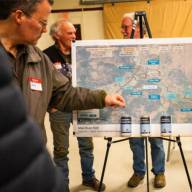“It’s another way for our community to stand out, to set itself apart. And it’s the right thing to do,” said Mad River Valley Chamber of Commerce executive director Eric Friedman about the chamber working with Vermont Adaptive and other community partners to develop a long-term plan to create a community-wide ethos regarding accessibility issues.
Friedman said that Fayston resident Nancy Phillips brought the issue of lack of accessibility in The Valley to him several months ago. She came and discussed her experience and research on the issue, offering Friedman a lot of information and education.
“I thought it was an important issue and took it to Jeff Alexander at Vermont Adaptive. He’d contacted me about helping with the production of a video about adaptive travel and what Vermont Adaptive was doing,” Friedman said.
The film crew and participants needed places to stay and eat and Friedman said it was incredibly eye-opening to realize how difficult it was to find suitable, accessible places for the athletes.
“The people who were going to be in the video were pretty hardcore athletes in wheelchairs,” he said.
Against the backdrop of Vermont Adaptive opening a $2.7 million facility at Mount Ellen last year, Friedman realized that there was an opportunity for The Valley to do a better job on welcoming and accommodating all athletes and visitors.
Friedman said he reached out to his membership including the lodging community where he found a receptive audience. He said there are a lot of misperceptions and reservations about the Americans With Disabilities Act and coming into compliance.
“There’s concern about trying to make old buildings compliant which are overshadowing efforts to just be better. It’s like a stewardship ethos. If compliance is not possible, how can we do better to make our properties accessible?” he explained.
Since his conversation with Phillips, he’s created an accessible parking space at the chamber’s visitor center and is trying to figure out a way to make a bathroom there accessible. It’s not coming into ADA compliance, but it’s making it better, he said.
He’s also discussed the issue with Felicity Fowler, Vermont Adaptive program director, considering how to frame ideas and see how to organize and galvanize the community. The first task is to create a task force to work on the issue. Parts of that work will be to encourage businesses to prioritize accessibility issues and go beyond compliance with ADA requirements and to create a business recourse page on the chamber website. Further work will be undertaken to develop a fund to help businesses provide accessibility and to encourage improved accessible recreational opportunities such as in trail development.
“It could have a huge economic impact for our business community if we could improve this and it’s the right thing to do,” he reiterated.













